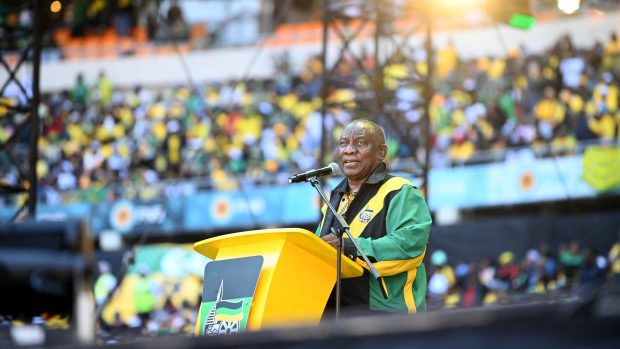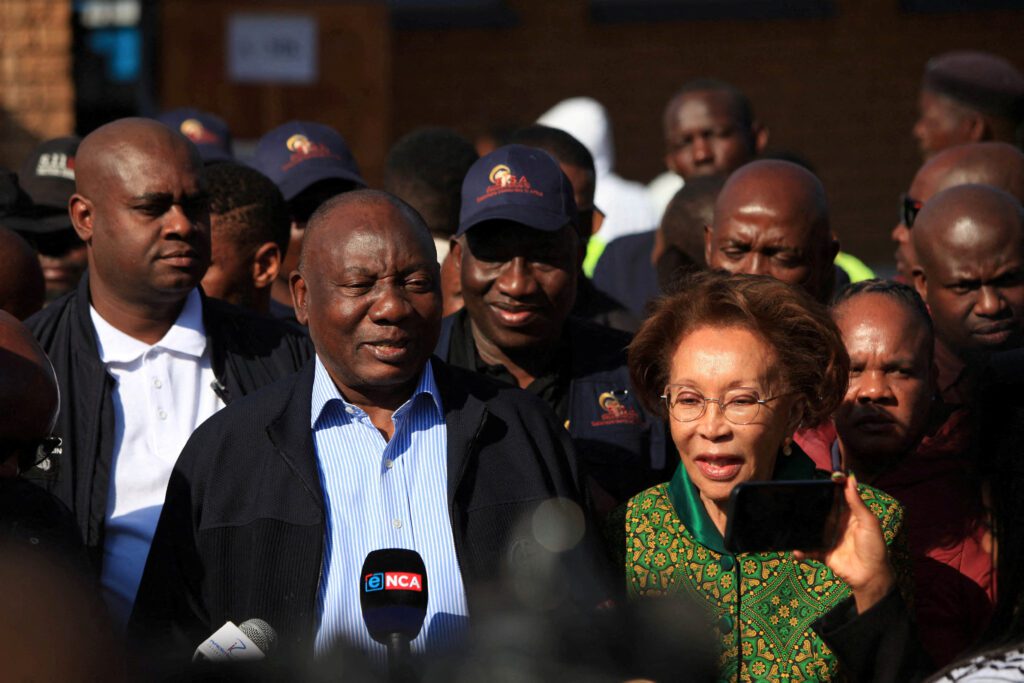Africa
ANC Affirms: Ramaphosa Will Not Resign to Form Coalition Government

The African National Congress (ANC) of South Africa has made it clear that they will not entertain any demands from potential coalition partners to have President Cyril Ramaphosa step down.
In an effort to present a united front after a significant decline in their majority, ANC secretary-general Fikile Mbalula stated that Ramaphosa will remain as the party leader and any requests for his resignation as a condition for talks will not be considered.
Mbalula emphasized that the ANC is open to discussions with all political parties in order to form a government that reflects the will of the people and ensures stability.
Despite receiving just over 40% of the votes, the ANC remains the largest party and needs to engage with others to establish a government and reelect Ramaphosa for a second term.
The results of the election have sent a clear message to the ANC, and they are committed to listening to the people of South Africa.
The ANC has various options for coalition partners, including the main opposition Democratic Alliance, which secured 21% of the votes.
In a significant development in South Africa’s political scene, the African National Congress (ANC) has affirmed that President Cyril Ramaphosa will not resign to form a coalition government. This decision comes amid ongoing discussions about the formation of a coalition government following the recent elections, signaling the ANC’s commitment to maintaining its leadership position in the country.

Background on South Africa’s Political Landscape
Historical Context of ANC’s Dominance
The ANC has been the dominant political force in South Africa since the end of apartheid, winning successive elections and forming the government. However, in recent years, its hold on power has weakened, leading to the emergence of opposition parties and calls for political reform.
Recent Developments Leading to Coalition Government Talks
The 2024 elections in South Africa resulted in a fragmented political landscape, with no single party securing a majority. This has necessitated negotiations between parties to form a coalition government, raising questions about the future direction of the country’s governance.
ANC’s Affirmation
Key Points from the ANC’s Statement
In its statement, the ANC reiterated its support for President Ramaphosa and affirmed that he would not resign to facilitate the formation of a coalition government. The party emphasized its commitment to stability and continuity in government, signaling its intent to lead any coalition arrangements.
Reasons Behind the Decision Not to Resign
The ANC cited the need for continuity and stability in government as primary reasons for its decision. It emphasized the importance of maintaining leadership continuity under President Ramaphosa to address the country’s pressing challenges effectively.
Ramaphosa’s Leadership
Assessment of Ramaphosa’s Tenure as President
Since assuming office in 2018, President Ramaphosa has pursued an agenda focused on economic reform, anti-corruption efforts, and social development. His leadership has been characterized by efforts to rebuild trust in government institutions and stimulate economic growth.
Challenges Faced by His Administration
Despite his efforts, Ramaphosa’s administration has faced numerous challenges, including slow economic growth, high unemployment rates, and persistent corruption allegations. These challenges have tested the government’s ability to deliver on its promises and maintain public confidence.
Prospects for Coalition Government
Likelihood of Successful Coalition Negotiations
The ANC’s decision not to resign suggests its confidence in its ability to navigate coalition negotiations successfully. While challenges remain, including differences in policy priorities among potential coalition partners, there is optimism about reaching agreements that serve the country’s interests.
Potential Partners and Their Political Agendas
Various opposition parties hold the key to forming a coalition government with the ANC. Each party brings its own set of policy preferences and priorities, which will need to be reconciled through negotiations to form a stable and effective government.
Public Reaction
Views from the South African Public on the ANC’s Decision
Public opinion on the ANC’s decision is divided. While some support the party’s stance on maintaining stability and continuity, others criticize it as a sign of reluctance to embrace change and reform. The coming days are likely to see further debate and discussion on the issue.
Expectations for the Future of the Government
The South African public is closely watching developments related to coalition negotiations and the future composition of the government. Expectations are high for a government that can address pressing issues such as unemployment, poverty, and inequality effectively.
Impact on ANC’s Image
Implications of the Decision for the ANC’s Credibility
The ANC’s decision not to resign could have both positive and negative implications for its image. While it demonstrates the party’s commitment to stability, it also raises questions about its willingness to adapt to changing political realities and embrace new approaches to governance.
Potential Effects on Voter Support in Upcoming Elections
The ANC’s handling of the coalition negotiations and its ability to deliver on its promises will likely influence voter support in future elections. Success in addressing key issues could bolster the party’s standing, while failure to deliver could erode its support base.
Economic and Social Stability
Importance of Political Stability for Economic and Social Progress
Political stability is essential for fostering economic growth, attracting investment, and ensuring social cohesion. A stable government with a clear mandate can implement policies that promote economic development and improve living standards for all South Africans.
Concerns About Instability and Its Effects on the Country
Conversely, political instability can have detrimental effects on the economy and society, leading to uncertainty, investor flight, and social unrest. The outcome of coalition negotiations will thus have far-reaching implications for South Africa’s future trajectory.
International Perspective
Reactions from International Observers and Leaders
The international community is closely monitoring developments in South Africa and its efforts to form a coalition government. Supportive statements from international leaders underscore the importance of political stability and democratic governance in the country.
South Africa’s Reputation on the Global Stage
South Africa’s ability to navigate coalition negotiations successfully will shape its reputation on the global stage. A stable and effective government can enhance South Africa’s standing as a regional leader and a partner for international cooperation and investment.
Path Forward
Strategies for Navigating Coalition Negotiations
Moving forward, the ANC and its potential coalition partners must engage in constructive dialogue and compromise to form a government that can address the country’s pressing challenges. Flexibility, pragmatism, and a commitment to national interests will be essential for success.
Long-Term Implications for South Africa’s Governance
The outcome of coalition negotiations will set the tone for South Africa’s governance in the coming years. A government that prioritizes unity, inclusivity, and effective leadership will be better positioned to address the country’s complex and interconnected challenges.
The ANC’s affirmation that President Ramaphosa will not resign to form a coalition government underscores its commitment to stability and continuity in South Africa’s governance. As coalition negotiations continue, the country faces both opportunities and challenges in shaping its political future. The outcome of these negotiations will determine the path forward for South Africa’s development and democracy.
FAQs
Why is there a need for coalition government talks in South Africa?
The fragmented political landscape resulting from the 2024 elections necessitates coalition government talks to form a stable and effective government with a majority in parliament.
What are the challenges facing President Ramaphosa’s administration?
President Ramaphosa’s administration faces challenges such as slow economic growth, high unemployment rates, and persistent corruption allegations, which require effective governance and policy interventions.
How does the ANC’s decision impact the stability of the government?
The ANC’s decision not to resign contributes to the stability of the government by maintaining continuity in leadership and avoiding potential disruptions that could arise from a change in leadership.
What are the potential outcomes of coalition negotiations?
The potential outcomes of coalition negotiations include the formation of a stable government with a clear mandate to govern, or the failure to reach agreements leading to further political uncertainty and instability.
What role does public opinion play in shaping the future of South Africa’s government?
Public opinion influences political decision-making and the outcomes of elections, shaping the composition and policies of the government. Public support is crucial for the legitimacy and effectiveness of government actions.
